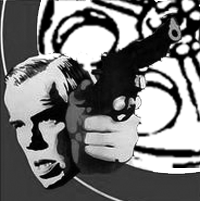 |
 |
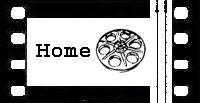 |
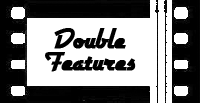 |
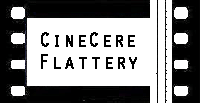 |
 |
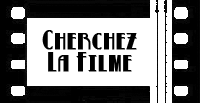 |
 |
 |

Inside Al Pacino
What's Going On With Spike's Little Friend?
After about a two month sabbatical from movies on the big screen I saw Inside Man and V for Vendetta on consecutive days. While neither one blew me out of the water, the disharmony of these two pictures in tandem was proof that the Double Feature is one of the best ways to watch films. The ideas and flavors from one movie brought the similar things in the other into greater relief than one might notice seeing just one on its own.
Between the two films, there was one thing in Inside Man that really stuck with me, kept me thinking and replaying the movie in my head trying to suss out a why. The question that stuck is a seemingly simple one, but for some reason I remain convinced that there is more to it than it seems on the surface. That question is, why three, count 'em three, textual references to Al Pacino?
- On the phone bank robber Dalton Russell refers to Detective Keith Frazier as "Serpico."
- During their face-to-face, Keith reminds Dalton, "You saw Dog Day Afternoon. You're stallin'."
- Finally, Keith's partner, Detective Bill Mitchell, gets mad and is looking for revenge "Michael Corleone style! Michael Corleone, do you renounce Satan? Yes, I renounce him. Pachow! Pachow!" This of course is the baptism scene from the end of The Godfather.
Why is this? It can't be coincidence; this isn't a Joss Whedon super pop culture heavy script. For three of the sparse references to all point to 1970's Pacino pictures would be about as likely as some of the mechanizations of the film's heist plot would be to play out cleanly in real life, but that's neither here nor there. The question is, why these three references?
The cynic in me says it was a simple selling point, and that rookie screenwriter Russell Gewirtz threw them in there to attract Big Al himself (probably to the role of Keith Frazier). But why then would a consummate professional like Spike Lee leave those lines in once Denzel Washington had taken the role and, more than likely, done a rewrite or six to fit the characters to the actors, none of whom play too far afield from their established star personae? Washington plays an almost impossibly charming police detective with a girl he loves and a job he believes in. Clive Owen dazzles as the roguish criminal mastermind. Jodie Foster takes a break from peril as Madeline White, a deal maker and favor broker to only the elitist of the elite. And finally, Christopher Plummer glowers his way through his role as Arthur Case, a banker who has sacrificed more than his soul on his way to the top.
So what key could these references hold? I would first point out that not only are these all direct Pacino references, and all from the mid-70's, but they are from three different crime pictures that put Pacino in three very different roles. First, there is Serpico; Pacino is the last honest cop. In Dog Day Afternoon, he plays a bottom rung bank robber; the scene quoted is when Michael Corleone literally becomes The Godfather.
Inside Man is a picture with basically three plots and three characters that could each be the protagonist of their own movies. First there is Keith, the true protagonist of the picture, a cop working his way up. Then Dalton, the bank robber with the "perfect plan"; and finally Ms. White is the unflappable fixer for rich scum. The parallels to the three Pacino roles aren't exactly a huge leap to make, but I think this is a little too simplistic.
I would posit that Inside Man that is primarily about race relations - not just because it's a Spike Lee Joint, though that's not a bad early indicator - and mind I said race relations, not simply race. The title sequence and the first scene after Dalton's opening monologue tell us that this is the game at hand. The credits roll over shots of New York City to the sounds of a Bollywood cut called "Chaiyya Chaiyya." After this, we see the proverbial melting pot standing around in line and at the desks of a downtown New York bank. It's a veritable Whitman's sampler of modern New York ethnicities. Lee has always been an artist who paints in broad strokes, but these characters are a little more detailed than Mars or Buggin Out. They're stereotypes at first glance, and people on inspection; in a way that confronts the audience with their own assumptions and prejudices.
Vikram, the Sikh we first see as he gives the respect knucks is a perfect example. Just like the NYPD officers who face him when he is sent out of the bank with the drawer, we see first the beard and turban, but that simple act of camaraderie - that fraternal bumping of fists - is all it takes to move him from caricature to character. Is it only a stereotype if it isn't true? Sikhs wear turbans; the majority of Americans do not. These are not stereotypes, these are facts, but to believe that Sikhs are extremely different from the non-turban wearing population is a stereotype. This is the game Lee is playing. With the masks on, who are the bad guys? It's not just because they have guns, it's how are they dressed, and what they look like.
At hand is still these pesky Pacino quotations. If Lee is playing the game of "You are how you look," I think he is likewise playing the game of "you are who you identify with." This is what Lee's name check of 50 Cent is all about. But then a black cop quoting and admiring the oh-so-Italian Michael Corleone, not only in his coolness, but in his vigilante actions? This is a radical moment. Much has been made of the fascination that modern hip-hop culture has with Pacino's role in Scarface and rightly so, although it is a shocking omission in this litany of Pacinoisms. But while it may be a bit too simplistic, the disenfranchised black empathy with the disenfranchised immigrant Cuban is not a far reach to make. Just as Warshow wrote of another Scarface oh so long ago, this new Scarface is also "the 'no' to that great American 'yes' which is stamped so big over our official culture."
But it's not Scarface that is quoted here, it's The Godfather. Michael Corleone is a son of the America that Bonasera so believes in. Although he is connected with his father's immigrant experience through his exile to Corleone, Sicily Michael is America. I feel that Keith and Bill are presented in the same light. They are America, and only a director so political and as iconoclastic as Spike Lee can get away with casting the charming, smart, ambitious police detective who stands as the most human and American character in the film as a black man and make it almost a non-issue. And why should it be? Yet in almost any other film, possibly even in one of Spike's earlier pieces, it would be.
Not to make too much of this little tidbit, but I believe that these Pacino quotes are there to give Inside Man a sense of place, not just in history as the Nazi diamonds plot, but in film history. Even ignoring the baggage brought by players with the incredible careers of Washington, Foster, and Plummer, which may or may not be of interest, these seemingly meticulously chosen references invoke not just 70s American genre filmmaking, a time when tried and true genres didn't mean irrelevant mercenary aping, but also an actor who defined a cultural identity for fans of multiple backgrounds.
This is why I say that Inside Man is about race relations and not simply race. Lee isn't saying things are smooth sailing for the black man in America, but I think he's saying they are better than they were when he asked us to Do The Right Thing. Keith has a layabout brother-in-law on his couch downin' 40's of Da Bomb - a brand reference to the Spike Leeverse; but other than the choice of beverage, how is that a racial issue? It's not. The couch surfing relative is a plague to the working man of every color.
